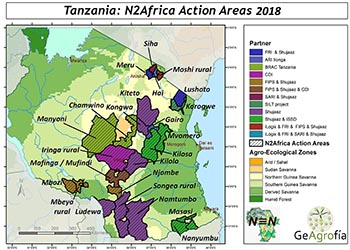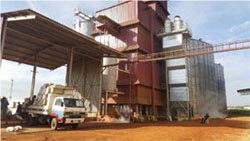| In Tanzania, N2Africa continued to maintain its presence in 22 districts (Figure 1) as a result of established strong partnerships with local governments, the national agricultural research centers, the local input companies and various development organizations working around these project target districts. The focus of 2018 was to implement the project exit strategy that fostered continuity of established activities by local governments, ensuring sustainable delivery of legume technologies (notably improved legume seeds, and inoculants) by public research institution and private sector and ensuring farmer’s access to markets. |  |
Some outcome of 2018
Capacity building
In 2018, one MSc student Fides Temu completed studies after successful submission of her thesis to Sokoine University in Tanzania. The project also hosted an intern Charlotte Mallet from Wageningen University to work on models that can predict bean (Phaseolus vulgaris L.) yields based on spectral analyses of soils. A new PhD student Wilson Charles was recruited to study the contribution of soyabean and maize value chain as part of food systems in the Southern Highlands of Tanzania.
Ensuring availably of quality seeds
Special trainings were offered to 146 community seed growers who were later registered to form 5 seed growers associations. These associations have capacity to produce 150Mt of both soyabean and common bean but in 2018 could only produce 95 Mt. Seeds are produced and sold locally as quality declared seed grade or through contracted by seed companies to produce certified seeds.
Inoculant distribution
A supplier-agro-dealer-village based agricultural advisor (VBAA) model for inoculant distribution to smallholder farmers was tested in the Southern Highlands of Tanzania. Three key participants in the model were identified as hub agro-dealers (Mtewele General Traders in Njombe region, Alpha Agro Chemical Supply in Iringa, and a local agro-dealer Makyao Agrovet based in Morogoro region) and several community volunteers (CV). The model is now proven repeatable and scalable for timely distribution of inoculant. Notable is that, farmer’s access inoculants cheaply, in time and with low risk when the VBAA distribution channel is used.
Access to output market
Legume growers are linked with the East Africa Grain Council (EAGC) who is assisting with developing and promotion of orderly structured marketing systems and providing farmers with market information across countries in the East Africa region. Soyabean growers through Agricultural Marketing Cooperative Societies in their localities are linked with four big animal feed manufacturers who indicated readiness to purchase 130,000 Mt of soyabean. They include Mount Meru Millers who requires 100,000 Mt, International TANFEED, 10,000 and Highland Millers, 20,000 Mt.
| On the other hand, leaders’ farmer groups have managed to engage 638 producer groups, with a total of 19,140 members capable of cultivating 28,720 ha of soyabean with anticipated production of about 30,000 Mt. In this development MT Meru has installed a soyabean solvent plant with the capacity to process 35,000 Mt. This indicates a bright future for soyabean production in Tanzania. |
Newly installed Soyabean solvent plant at Singida in Tanzania by MT Meru millers. |
Assessment of effectiveness of dissemination approaches
Assessment of effectiveness of some dissemination approaches used by N2Africa and partners were done in collaboration with the Canada’s International Development Research Centre (IDRC) funded project “Suitable Intensification of Legume Technologies in Tanzania” (SILT). Demonstrations and field days were found to enhance uptake of innovations by all gender groups. Integration with interactive radio listening groups at community level ensured more targeted reach of women and youth. Information sharing was observed at family level particularly by older and male family members. Though currently less structured, it provides an opportunity to promote family focused learning.
Assessment of impact of N2Africa
The impact survey was conducted in key intervention three districts namely Moshi, Ludewa and Songea covering a total of 630 farming households. Preliminary results show great achievements of the project in awareness creation and use of fertilizer on legumes, inoculant and seeds of improved varieties and rotating or intercropping cereals and legumes.
Freddy Baijukya, N2Africa Country Coordinator Tanzania
(For the full 2018 report of Tanzania click here)

